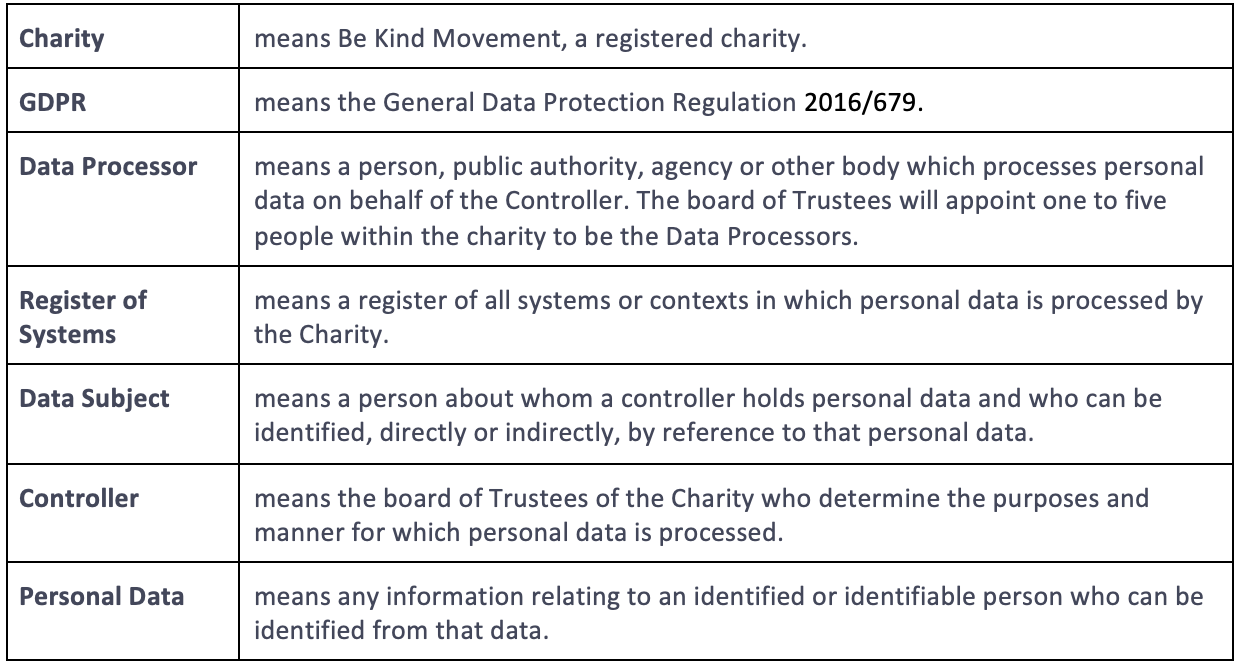Be Kind Movement’s Data Protection Policy
Definitions
Data protection principles
The Charity is committed to processing data in accordance with its responsibilities under the GDPR.
Article 5 of the GDPR requires that personal data shall be:
Processed lawfully, fairly and in a transparent manner in relation to individuals;
Collected for specified, explicit and legitimate purposes and not further processed in a manner that is incompatible with those purposes; further processing for archiving purposes in the public interest, scientific or historical research purposes or statistical purposes shall not be considered to be incompatible with the initial purposes;
Adequate, relevant and limited to what is necessary in relation to the purposes for which they are processed;
Accurate and, where necessary, kept up to date; every reasonable step must be taken to ensure that personal data that are inaccurate, having regard to the purposes for which they are processed, are erased or rectified without delay;
Kept in a form which permits identification of data subjects for no longer than is necessary for the purposes for which the personal data are processed; personal data may be stored for longer periods insofar as the personal data will be processed solely for archiving purposes in the public interest, scientific or historical research purposes or statistical purposes subject to implementation of the appropriate technical and organisational measures required by the GDPR in order to safeguard the rights and freedoms of individuals; and
Processed in a manner that ensures appropriate security of the personal data, including protection against unauthorised or unlawful processing and against accidental loss, destruction or damage, using appropriate technical or organisational measures.”
General provisions
This policy applies to all personal data processed by the Charity;
The Controller shall take responsibility for the Charity’s ongoing compliance with this policy;
This policy shall be reviewed at least annually;
The Charity shall register with the Information Commissioner’s Office as an organisation that processes personal data.
Lawful, fair and transparent processing
To ensure its processing of data is lawful, fair and transparent, the Charity shall maintain a Register of Systems;
The Register of Systems shall be reviewed at least annually;
Individuals have the right to access their personal data and any such requests made to the charity shall be dealt with in a timely manner;
A Data Privacy Notice will be made accessible to all data subjects. The Data Privacy Notice will detail the nature of the data being collected, the purpose(s) for which the data is being collected and the subject's rights in relation to the Charity’s use of the data and other relevant information in compliance with the prevailing GDPR requirements.
Lawful purposes
All data processed by the charity must be done on one of the following lawful bases: consent, contract, legal obligation, vital interests, public task or legitimate interests (see ICO guidance for more information);
The Charity shall note the appropriate lawful basis in the Register of Systems;
Where consent is relied upon as a lawful basis for processing data, evidence of opt-in consent shall be kept with the personal data;
Where communications are sent to individuals based on their consent, the option for the individual to revoke their consent should be clearly available and systems should be in place to ensure such revocation is reflected accurately in the Charity’s systems.
Data minimisation
The Charity shall ensure that personal data are adequate, relevant and limited to what is necessary in relation to the purposes for which they are processed;
In complying with GDPR guidance, different factors may be taken into account when considering whether particular personal information is adequate or relevant for the intended purpose. Such factors include whether the personal information pertains to recruitment of employees or volunteers and any children involved in the Charity’s workshop programmes.
Accuracy
The Charity shall take reasonable steps to ensure personal data is accurate;.
Where necessary for the lawful basis on which data is processed, steps shall be put in place to ensure that personal data is kept up to date;
Where the Charity finds any inaccuracies in their data, said inaccuracies will be erased or rectified without delay.
Use of Data Processors
The Controller will appoint at least one and not more than five appropriate persons, to be the Data Processors for the Charity;
The Controller must only appoint Data Processors who can provide sufficient guarantee to comply with the GDPR and that the rights of data subjects will be protected;
Where a Data Processor can demonstrate that they adhere to approved codes of conduct or certification schemes, this should be taken into consideration for choice of Data Processor;
Where the Charity uses a Data Processor, a written contract with compulsory terms as set out in Article 28 of the GDPR must be in place (plus any additional requirements that we determine);
Data Processors can only act on the instruction of the Controller.
Data Retention
To ensure that personal data is kept for no longer than necessary, the Charity shall put in place a data retention policy for each area in which personal data is processed and review this process annually;
The retention policy shall consider what data should/must be retained, for how long, and why.
Security
The Charity shall ensure that personal data is stored securely using modern software that is kept-up-to-date;
Access to personal data shall be limited to personnel who need access and appropriate security should be in place to avoid unauthorised sharing of information;
When personal data is deleted this should be done safely such that the data is irrecoverable.
Appropriate back-up and disaster recovery solutions shall be in place;
Where appropriate, personal data shall be encrypted. The encryption key will be held securely by the Controller.
Breach
A breach of security means a breach of security leading to the accidental or unlawful destruction, loss, alteration, unauthorised disclosure of, or access to, personal data;
All members of staff should be vigilant and able to identify a suspected personal data breach. A breach could include:
Loss or theft of devices or data, including information stored on USB drives or on paper;
Hacking or other forms of unauthorised access to a device, email account, or the network;
Disclosing personal data to the wrong person, through wrongly addressed emails, or bulk emails that inappropriately reveal all recipients email addresses;
Alteration or destruction of personal data without permission.In the event of a breach of security, the Charity shall promptly assess the risk to people’s rights and freedoms and if appropriate report this breach to the ICO (more information on the ICO website).
Third Party Access to Data
The Charity will only share personal data with Third Parties where the Controller authorises that it is necessary and unavoidable to do so in order to achieve its charitable objectives. Where appropriate, Data Subjects will be informed in advance of the need to share any of their personal data with a Third Party.
The Charity will take reasonable steps to ensure that the Third Party is compliant with the provisions of the GDPR before sharing any personal data. Any contract between the Charity and the Third Party will specify that both parties must at all times comply with GDPR regulations according to their up to date Data Protection Policies.
The Rights of Data Subjects
All Data Subjects hold the following rights under the GDPR which the Charity must comply with:
The right to be informed. The Data Subject needs to be informed of what data has been collected, how it is being used, how long it will be kept and whether it will be shared with any third parties;
The right to access. When a subject access request is made in writing, the Charity will need to provide a copy of the Data Subject’s personal data within one month of the request. This right is subject to the request not being manifestly unfounded, repetitive or excessive;
The right to rectification. Where there are any inaccuracies or incomplete elements in the personal information collected by the Charity, the Data Subject can request in writing that this information be updated, and the Charity must update the data within one month of the request;
The right to erasure. The Data Subject may request that the Charity erases their data where withholding the data is no longer necessary, the data has been unlawfully processed or it no longer meets the lawful ground for which it was collected, this includes removing consent;
The right to restrict processing. Alternatively, the Data Subject can request that the Charity limits the way their personal data is used;
The right to data portability. Where personal data has been obtained by way of consent or contract, the Data Subject has the right to obtain and reuse their personal data;
The right to object. The data subject shall have the right to object, on grounds relating to his or her particular situation, at any time to processing of personal data concerning him or her which is based on Public Task or Legitimate Interest. The controller shall no longer process the personal data unless the controller demonstrates compelling legitimate grounds for the processing which override the interests, rights and freedoms of the data subject or for the establishment, exercise or defence of legal claims.
Where personal data are processed for direct marketing purposes, the data subject shall have the right to object at any time to processing of personal data concerning him or her for such marketing, which includes profiling to the extent that it is related to such direct marketing;
Where the data subject objects to processing for direct marketing purposes, the personal data shall no longer be processed for such purposes;
At the latest at the time of the first communication with the data subject, the right referred to in paragraphs 1 and 2 shall be explicitly brought to the attention of the data subject and shall be presented clearly and separately from any other information.
Rights related to automated individual decision-making, including profiling. The data subject shall have the right not to be subject to a decision based solely on automated processing, including profiling, which produces legal effects concerning him or her or similarly significantly affects him or her. However, this shall not apply if the decision:
i. is necessary for entering into, or performance of, a contract between the data subject and a data controller;
ii. is authorised by Union or Member State law to which the controller is subject and which also lays down suitable measures to safeguard the data subject’s rights and freedoms and legitimate interests; or
iii. is based on the data subject’s explicit consent.
In the cases referred to in points (i) and (iii), the data controller shall implement suitable measures to safeguard the data subject’s rights and freedoms and legitimate interests, at least the right to obtain human intervention on the part of the controller, to express his or her point of view and to contest the decision.
Responsibility for the processing of Personal Data
The Controller takes ultimate responsibility for data protection.
If you have any concerns or wish to exercise any of your rights under the GDPR, then you can contact the Controller by emailing info@bekindmovement.co.uk
Last update: 23 July 2020
Next review date: 23 July 2021
END OF POLICY

